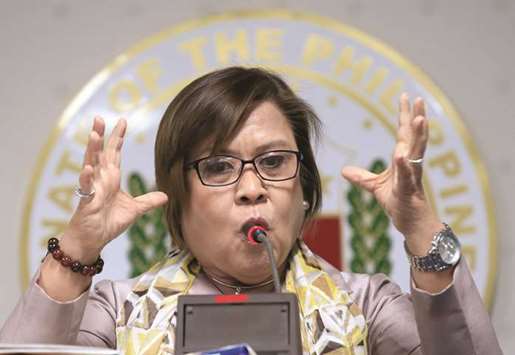The Rodrigo Duterte administration’s “trademark impunity” appeared to have reached the judiciary with the Sandiganbayan’s order to release former Sen. Jinggoy Estrada, Sen. Leila de Lima said.
De Lima raised doubts over the Sandiganbayan Fifth Division’s decision to grant his petition for bail, an appeal the division junked last year under a different set of judges, Philippine Daily Inquirer reported.
“Is the judiciary now introducing new procedure and doctrines just to accommodate the whims of the president?” De Lima said in a statement, which she posted on Facebook, labelled as Dispatch from Crame No. 164.
“After a previous bail denial on the ground that the evidence against Estrada is strong, a reconstituted Sandiganbayan division with Duterte appointees suddenly finds cause to set Estrada free not because they now find the evidence weak, but because the court thinks that Estrada is not a flight risk,” she added.
Estrada, who was accused of plunder and 11 counts of graft and corruption, was released from the Philippine National Police (PNP) Custodial Centre after posting a P1.3mn bail on Saturday.
His release came a day after the Sandiganbayan Fifth Division ruled that “there was no strong evidence” that Estrada was the “main plunderer” in the alleged P10bn pork barrel scam.
De Lima, who is detained at the PNP Custodial Centre on drug charges, said the exoneration of plunderers under the Duterte administration is “almost complete.”
“After the Marcoses, Enrile, Arroyo and now, Estrada, and the impending release of Bong Revilla and Janet Lim Napoles, Congress might as well decriminalise the crime of plunder and repeal the Anti-Graft and Corrupt Practices Act because they have become useless and worthless under Duterte and his virtual amnesty programme for the country’s top plunderers,” the senator said.
Estrada is the second high-ranking government official released from detention under the Duterte administration. The first is former president Gloria Macapagal-Arroyo, who was acquitted of plunder last year.
De Lima pointed out that the country was under an “absolute dictatorship” as President Rodrigo Duterte could control the two other branches of government – the Congress and the judiciary, who “allow themselves to be dictated upon.”
“We might be going back to the martial law judiciary of the 1970s – a time when the subservience of the judiciary was symbolised by the chief justice serving as the umbrella-holder of Imelda Marcos – even without martial law,” she said.
And with that kind of Congress and judiciary, De Lima said, Duterte would no longer declare martial law.
“We are already under a dictatorship, with Congress and the judiciary already under Duterte’s thumb,” she said. “A martial law proclamation would just be a
formality.”

De Lima: warning about government’s impunity
